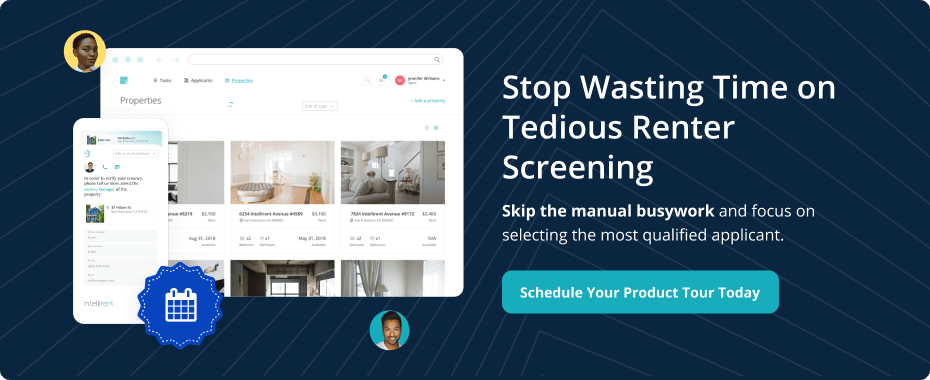January 09, 2024 • 6 min read

You’ve heard Transunion SmartMove reports are comprehensive background and renters credit report solutions for landlords… but all the data in the world won’t help you if you don’t understand what you’re looking at.
Examining a credit and background report can sometimes feel like you’re trying to read something in a foreign language: you know critical and valuable information is within your grasp… but it doesn't do you much good without the ability to comprehend what you’re looking at.
This post is your translation guide! We’ll show you what’s on a Transunion SmartMove report and how to read it. Then, we’ll cover five common questions about SmartMove reports, giving you all the information you need to find tenants for a rental property and screen them appropriately.
What Does a Transunion SmartMove Report Show?
TransUnion SmartMove is a tool that streamlines the tenant screening process for landlords and property managers. Landlords can request background checks by creating a free account and inviting applicants to undergo screening. SmartMove verifies applicants' information, generating a comprehensive report covering credit checks, criminal history, eviction records, and Income Insights. This database spans all 50 states and Washington D.C.
Let’s look at what the report landlords receive from Transunion SmartMove shows. The report consists of four major sections:
Credit Report:
The credit report offers insights into an applicant's financial history and habits. It reveals details such as a history of late payments and the applicant's credit score. This information gives property managers a sense of the applicant's financial reliability and track record when fulfilling financial obligations.
Related Read: How to Read a Credit Report PDF (Plus 6 Things to Look Out For)
Criminal Background Check:
The criminal background check delves into an applicant's history with the law. It outlines prior convictions, outstanding warrants, or appearances on Most Wanted lists. Additionally, this section verifies whether the applicant is listed on the sex offender registry. This data is critical for assessing potential safety concerns associated with the applicant.
Eviction History:
The eviction history section offers transparency regarding the reasons behind previous eviction proceedings for an applicant. Property owners and managers can use this information to understand potential red flags related to the applicant's rental history.
Resident Score:
The resident score consolidates all the provided data into a single, predictive score. This score is a comprehensive indicator of how likely the applicant is to perform as a tenant. The resident score considers factors like the credit report, income verification, criminal background check, eviction history, and other relevant details.
Armed with this information, let’s now answer five common questions landlords and property managers ask about Transunion SmartMove reports.
1. What are the Legal Requirements and Restrictions for using SmartMove Reports?
When using SmartMove reports (or any tenant screening report), landlords and property managers must play by the rules, and the Fair Credit Reporting Act (FCRA) is one key rulebook. Property managers must follow specific guidelines for obtaining, using, and disposing of consumer information to protect applicants' privacy and rights. Take steps to properly manage and store the data obtained in your SmartMove reports, and responsibly dispose of it when it’s no longer needed.
Another requirement to consider is tenant consent. Before you dive into running a credit and background check using SmartMove, make sure you have the green light from the tenant. Get your applicants’ written consent, ensuring they know the screening process and what it entails.
Related Read: The Ultimate Apartment Screening Process: Approve the Most Qualified Applicants
Next up, you need to be aware of discriminatory practices. To stay on the right side of the law, it's crucial to ensure you set and stick to common rental criteria and use SmartMove reports in a manner that does not lead to discrimination against protected classes. Fair housing laws are in place to prevent this, so be sure to follow them to the letter.
Communication is key in all steps of the property management process, and tenant screening is no different. If you decide not to rent to an applicant based on what you find in a SmartMove report, you might be required to give them an adverse action notice. This notice should include details about the report that influenced your decision and how they can dispute it.
Finally, federal laws are crucial to understand, but don't forget about state and local regulations. Some areas may have additional rules regarding tenant screening, so it's essential to be aware of and follow them.
2. How Long Does a SmartMove Report Take?
How long does tenant screening take? You need the perfect tenant in your vacancy ASAP, so you need to know how long the checks on your SmartMove report will take to come back. The good news is that SmartMove reports are usually speedy. You can expect one in your hands within minutes to a few hours after the applicant provides all the necessary information.
The speed of your report can vary based on a few factors. If the applicant's details are complete and they've responded promptly, you're more likely to get your report on the quicker end of the spectrum.
On the other hand, incomplete information or delays in providing the needed data can slow things down, so ensure you communicate the importance of quickly providing all the requested data to your applicants.
3. How Can I Interpret SmartMove Report Results?
Alright, you've got your SmartMove report in hand — now what? Here's a quick guide on how to make sense of it:
- Credit Score Analysis: Take a good look at the applicant's credit score. Higher scores usually mean they're more financially reliable, but this isn’t a hard-and-fast rule. You can still consider applicants with lower scores or limited credit history, you just may choose to use a guarantor or other safeguard.
- Rental History and Eviction Records: In the rental history and eviction records section, you can see if your applicant has had any bumps in the road with previous landlords. Watch out for recurring issues and contact previous landlords if your state allows.
- Criminal Background Check: Next up is the criminal background check. This section will highlight any criminal charges your applicant has faced. Watch for violent crimes, property damage, or crimes that have landed your applicant on the National Sex Offender Registry.
- Income and Financial Data: Consider the applicant's income and financial info. You want to ensure they have the finances to meet their rental obligations without breaking the bank or defaulting on rent.
- Red Flags: Lastly, be on the lookout for red flags. These could be things like multiple late payments, high levels of debt, or serious criminal convictions. Red flags can indicate potential issues down the road.
4. What Data Security Measures Does SmartMove Have?
Your SmartMove report involves collecting personal information from your applicants, including addresses and social security numbers. You need to ensure that data is protected so you — and your applicants — don’t run into trouble down the road.
SmartMove takes data security seriously. Their data is encrypted during transmission and stored on secure servers with tight access controls once received.
Related Read: How Does Online Tenant Screening Work?
SmartMove plays by the rules and aims to comply with data protection regulations, especially consumer information-related ones. They're all about keeping your and your applicants' data safe and sound.
5. What Alternatives to Transunion SmartMove Can I Consider?
Through this post, we’ve focused on the elements and uses of a Transunion SmartMove report. However, it’s important to note that SmartMove is not the only option you should consider related to tenant screening for your properties.
One alternative to SmartMove is to conduct in-house screening. In this process, you directly contact references, conduct background checks, and verify financial information. However, this can be time-consuming and prone to errors. We do not recommend in-house screening for most landlords.
Another option is to choose a free, comprehensive tenant screening solution like Intellirent. Our tool offers a comprehensive tenant screening solution that can save you time and effort, all at no cost to you.
With Intellirent, you can use our proprietary Renter SmartMatch tool to screen tenants and receive easy-to-compare Renter Resumes for each applicant within minutes. Our solution offers a modern, efficient way to handle tenant screening. Check out a free product demo today to learn more and see if our solution is right for you!
Transunion SmartMove Report vs Renter SmartMatch
The information in this post should give you a clear picture of the features and functionality available through Transunion SmartMove reports. Transunion’s solution is reliable and feature-rich, but that doesn’t mean it’s the right solution for every property manager.
If you are looking for an all-in-one tenant screening solution that offers background checks, credit reports, and more — all at a $0 price point for landlords — consider Intellirent!
Our solution offers customizable applications, an easy-to-use property listing tool, and Renter Resumes, which compile all applicant data into an easy-to-compare format, giving you all the tools you need to find and select the best renters for your properties.
Take a product tour today to see how Intellirent can simplify your leasing process.
Published by Kara Hohne
January 09, 2024
Related Articles
May 09, 2023 • 7 min read
September 05, 2023 • 6 min read
Subscribe For Insights
Get actionable leasing tips, tools, and best practices directly to your inbox. Don't miss out on the insights that'll help your team confidently find, screen, and approve the most qualified renters.


